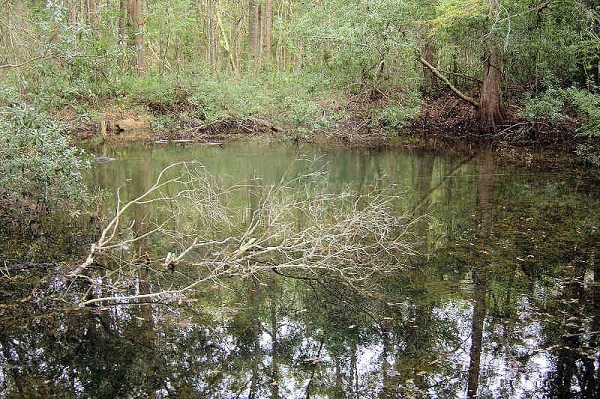
With the fall of the Mississippi River to Federal forces in 1863, Texas and other western cattle sources were virtually cut off from the Confederate Army. The Confederate government turned to Florida to supply beef to feed the army. Special Calvary companies were raised in Florida by Major C. J. MUNNERLYN, to gather and drive the cattle north to the army. They also protected the cattle from the raids of the bands of deserters (who were allied with Federal forces), which operated in the area. Gun boats from the blockade fleet could come in or close to the mouths of the Aucilla, Econfina, Warrior and Steinhatchee Rivers and join forces with the deserter groups and destroy salt works along the gulf coast as well as taking cattle. A large band of deserters that operated in Taylor County was the William W. Strickland band; they called themselves “The Independent Union Rangers of Taylor County.” In a February 1864 salt works raid on the Taylor County coast, Federal sailors aided by 96 men of the deserter bands in the area destroyed 6000 bushels of salt stored in barrels, a multitude of kettles, tools, store houses, stables, 600 bushels of corn and many sheds. 1000 head of cattle, 2500 pounds of bacon, 18 mules, 5 wagons and two horses were captured and turned over to the deserter bands. [*1] In April of 1864 [*2] in Taylor County, Florida, Captain J. W. FAULKNER raised, Company A of the 1st Battalion Florida Special Cavalry. Their area of operation was Taylor and Lafayette counties. Being in adjoining counties, they probably worked together at times with Captain J. C. Wilcox’s Company B, from Madison County. D. W. BURNETT of Captain Wilcox’s Company said, we were detailed to do guard duty and drive cattle for the government, which we did from Dead man’s Bay in Florida and other Florida points, to be delivered to Macon, Columbus and Charleston, South Carolina. TOM L. GUNTER of Faulkner’s Company said, in August 1864 he was detailed with several others to go to Jefferson County with Bill Thomas to guard cattle, make jerky and ship the beef to the army. Two members of this company were detailed to make barrels for the war effort. JOSHUA EZELL had a contract with the Confederate government to build barrels, in Taylor County during the war. His son W. H. EZELL was detailed to work with his father making the barrels. These barrels were most likely used to ship salt and salted beef, pork and fish to the troops.
Many of the skirmishes that Captain Faulkner’s Company and the other “Cow Calvary” Companies had with the bands of deserters and federal forces were not always recorded. There is however a record of one of the battles Captain Faulkner’s Company had that did not go in their favor. E.B. SANDERS of Captain MCGEHEE’S Company B, Madison County Home Guards / State Militia, says in his pension records that he furnished his own horse and that he had a pack of good dogs that were trained to run men. He did effective service with them in capturing deserters for several months. He states that after the deserters and Yankees (Possibly this was William White’s Group, which operated in the Steinhatchee River area) had whipped Faulkner’s Company and ran them out of Pumpkin Swamp in Lafayette County, that he took a squad of men and his dogs and routed the deserters and ran them out of the swamp back down the river (Steinhatchee River) to the gun boat which was waiting at its shore. Captain Faulkner’s Company met for drilling and recruited at a site on the Fenholloway River in Taylor County. This site was called Camp Carlton. W. T. Cash in his “History of Taylor County” says it was located about 3 1/2 miles southeast of Perry on the Fenholloway River. Mr. Cash also states in an article he wrote in the 1920’s, that the site was being called “The Camp Ground” at that time. Based on a 1955 USGS topographical map, I believe the site of “Camp Carlton” was located approximately 500 yards northeast of the Fenholloway River Bridge on Highway 19 & 27. The map shows a spring at that location named “Camp Ground Spring”. It seems that this would be the logical location since it would have provided a source of fresh water for the soldiers encamped there. Captain Faulkner’s Company was disbanded in 1865 at the close of the war. Private DAVID EZELL says in his pension records that he surrendered his rifle and cartridge box at Camp Carlton and was given a verbal discharge by Captain Faulkner. Those in the unit with horses went to Madison, Florida and were paroled. During the years following the war some criticism of the Home Guards/ State Militias and the “Cow Calvary” took place, saying these men (or mostly boys some as young as 16), joined these units as a dodge from regular military service. After researching for this article it is this author’s opinion that this company, as well as the rest of the companies in Munnerlyn’s Battalion provided valuable service to the Confederacy and for the most part were sincere in choosing this service. They did their duty which was to provide beef and provisions to the army and to act as a coastal defense unit, sometimes risking life and limb in doing so.

Camp Ground Spring as it appears today
*1 The Official Records of the Union and Confederate Navies in the War of
Rebellion. Series 1 Volume 17, Pages 649-650.
*2 Taylor County History and Civil War Deserters. By W. T. Cash
Copyright © 1996 - The USGenWeb® Project, FLGenWeb, Taylor County